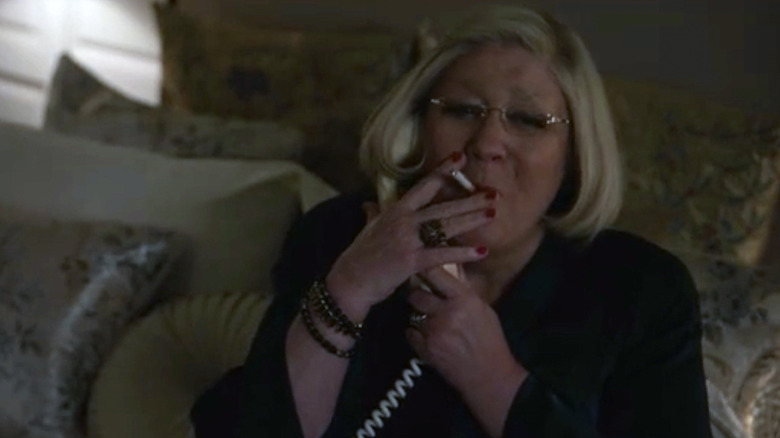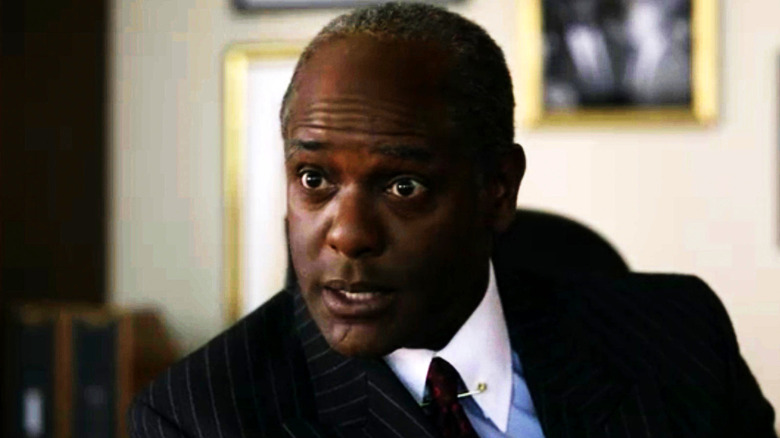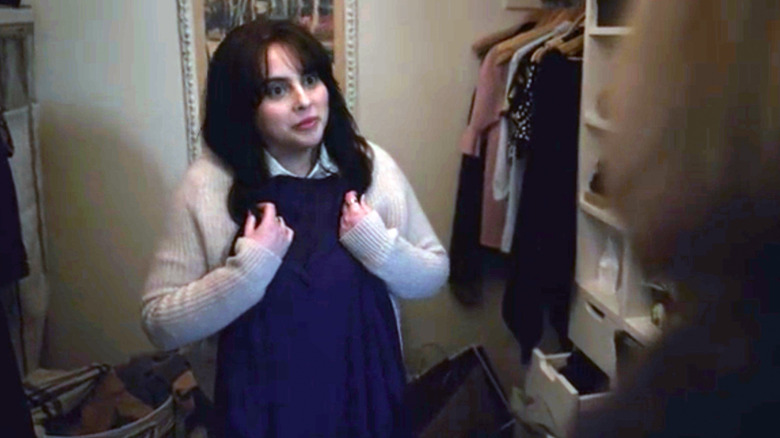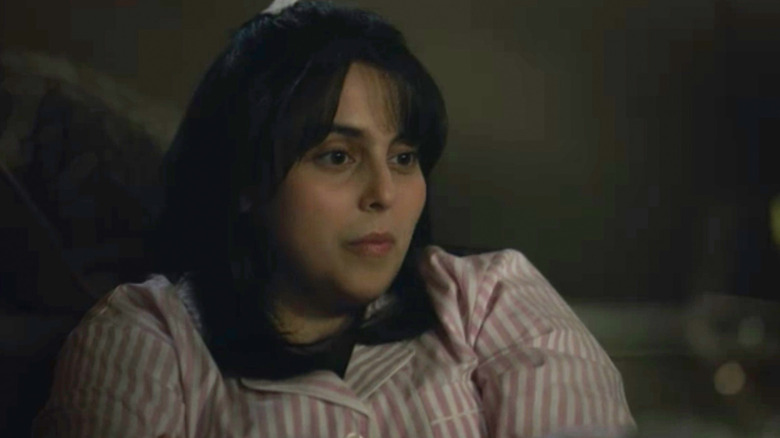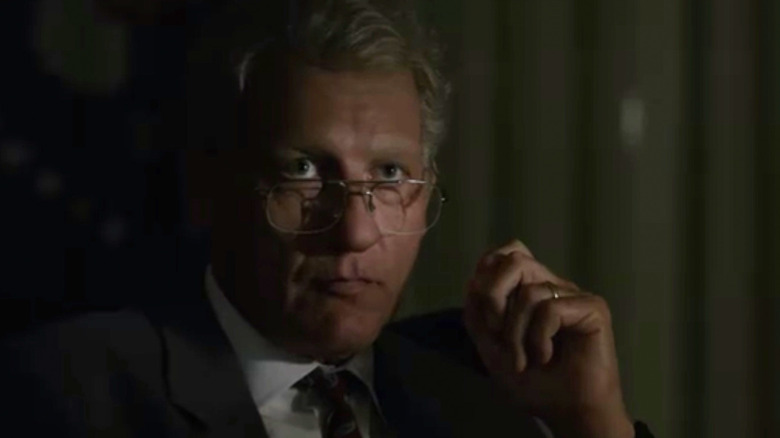How Accurate Is Impeachment: American Crime Story Episode 4?
"Impeachment" is the latest season in the FX limited anthology series "American Crime Story." After the first two seasons dramatized the O.J. Simpson murder trial and the killing of Gianni Versace, respectively, Season 3 recounts the effort to impeach President Bill Clinton (Clive Owen) over his affair with White House intern Monica Lewinsky (Beanie Feldstein). In particular, the show focuses on Clinton's multiple alleged abuses of power from the perspectives of the women who experienced them. The friendship between Lewinsky and her confidante/ultimate betrayer Linda Tripp (Sarah Paulson) is explored in-depth, as is Paula Jones's (Annaleigh Ashford) efforts to extract an apology from the president for alleged sexual assault.
Episode 4, "The Telephone Hour," aired on September 28, 2021. It portrays the fateful moment when Tripp decides to begin recording her phone conversations with Lewinsky, which would ultimately play a crucial role in Clinton's subsequent trial. The episode ends with Lewinsky and Tripp being added to the witness list in the Jones trial, which threatens to make the whole scandal go public.
As with any show or movie that dramatizes historical events, some of "Impeachment" is true and some is invented. Here's what's fact and what's fiction in Episode 4.
Linda Tripp begins recording the conversations: partly accurate
Early in the episode, Linda Tripp gets a call from Lucianne Goldberg (Margot Martindale), a conservative publisher and activist (via PBS). Earlier in the season, Goldberg passed on a book pitch from Tripp about her recollections working for Vince Foster. Now, Tripp pitches her on an even more salacious story: Monica Lewinsky's secret relationship with President Bill Clinton. Goldberg is interested, but she encourages Tripp to begin recording her conversations with Lewinsky for proof and advises her that it's legal to do so. Tripp agrees.
The suggestion to record the phone calls did indeed come from Goldberg, who admitted as much to "The New York Times." However, the show characterizes the advice as motivated by Goldberg's desire to sell Tripp's book. Goldberg and Tripp have both claimed that their reason for taping the phone calls was for self-preservation, not money (via Slate).
"I warned her to cover herself," Goldberg told the Times. "I told her that without a tape nobody would believe this stuff, that it's too painful to believe. And I warned her what would happen to her if she went ahead with this, that the [Clinton] slime machine would start putting out all kinds of things about her." But as with many moments on this show, it's impossible to know people's true motivations. All we have to go on is what they've said publicly.
Goldberg also did tell Tripp that it was legal to record Lewinsky without her consent. In fact, different states have different rules regarding consent to wiretapping. While it was legal in Goldberg's home state of New York, it was illegal in Maryland, where Tripp lived. Tripp later characterized this as "an honest mistake." Federal prosecutors later considered prosecuting Tripp for illegal wiretapping but ultimately dropped the charges (via Vulture).
Monica Lewinsky's search for a new job: partly accurate
When Episode 4 begins, Monica Lewinsky is still trying to get her job at the White House back, without success. Meanwhile, Linda Tripp and Lucianne Goldberg take some of Tripp's recordings to Newsweek journalist Michael Isikoff (Danny Jacobs). Isikoff refuses to report on them unless there's a clear abuse of power involved, like a quid pro quo. So, Tripp encourages Lewinsky to pressure President Bill Clinton to find her a non-White House job in New York City. This leads to a job offer from U.N. Ambassador Bill Richardson, which Lewinsky declines. Lewinsky then meets with Clinton's associate Vernon Jordan (Blair Underwood), who helps her get a job offer from Revlon's public relations department. As the meeting ends, Jordan slaps Lewinsky on the bottom.
According to Madeleine Kaplan, researcher on the Slate podcast "Slow Burn," which covered the Lewinsky-Clinton scandal, the meeting between Tripp, Goldberg, and Isikoff actually happened, but Isikoff later denied that he encouraged them to keep manipulating Lewinsky for more evidence (via Vulture).
Lewinsky did indeed receive both job offers, although the U.N. ambassador staff job offer came from Richardson's chief of staff, not the ambassador himself (via Slate). The meeting with Jordan also happened, including the slap. Describing the moment to Kenneth Starr's investigators, Lewinsky called the slap "playful," like Jordan was saying, "Get out of here, kid" (via The Tampa Bay Times).
The infamous blue dress: disputed
Practically everyone who lived through the Clinton impeachment scandal remembers the "blue dress" and its infamous stain, and Episode 4 finally introduces it. On the show, Monica Lewinsky invites Linda Tripp over for a drink, which turns into a sleepover. Tripp tells Lewinsky that she's lost some weight, and Lewinsky encourages her to try on some of her clothes. While rummaging through Lewinsky's closet, Tripp stumbles on the blue dress, and Lewinsky tells her how it got the stain.
According to Kaplan, the big inaccuracy in this scene was that it was Tripp who first noticed the stain and figured out what it was, not Lewinsky, which is how Tripp describes the incident in the HBO documentary "Monica in Black and White" (via Slate).
However, "Impeachment" showrunner Sarah Burgess said that she wrote the scene with the input of Lewinsky, who's also a producer on the show. Burgess said she originally had a different vision of the scene but later revised it in order to give Lewinsky more agency. "It was giving Monica more of a voice and explaining why she had it and it's telling the true story of what happened," Burgess told Yahoo.
Lewinsky's past relationships: accurate
During the sleepover, Monica Lewinsky tells Linda Tripp about her dating history before President Bill Clinton. Lewinsky describes the first time she fell in love. While in high school, she joined the school's drama department. A school employee named Andy took an interest in her and the two began dating. Lewinsky later found out that Andy was engaged, which made it an affair. According to Lewinsky, Andy encouraged her to befriend his wife so that they would have an excuse to see each other. When Lewinsky was considering colleges, Andy encouraged her to attend a school in Portland, Oregon, which she did. Later, when Andy was forced out of his job after another inappropriate relationship with a student, he relocated his family to Portland and their affair continued. Lewinsky also describes losing her virginity at age 14 due to sexual assault from a camp counselor.
It's unclear whether this conversation between Lewsinky and Tripp actually occurred, but this is an accurate representation of Lewinsky's personal life. "Andy" is a man named Andy Bleiler, whom Lewinsky did indeed become involved with while he was married and working at her school. In 1998, Bleiler came forward to disclose his relationship with Lewinsky via his lawyer Terry Giles.
According to Kaplan, the sexual assault when Lewinsky was 14 wasn't public knowledge before "Impeachment" aired (via Vulture). But again, Lewinsky was a producer on Season 3 and personally vetted each script before it was filmed. As Beanie Feldstein told Yahoo, "I knew that every word that I was saying was approved and had been to Monica first."
Clinton's reaction to Lewinsky and Tripp being put on the Jones witness list: accurate
As the episode ends, Lucianne Goldberg tips off the conservative lawyers working behind the scenes on the Paula Jones case about President Bill Clinton's relationship with Monica Lewinsky, and Jones's lawyers decide to add Lewinsky and Linda Tripp to their witness list to give their case more weight. Clinton's lawyer Bob Bennett (Chris McDonald) informs the president that both women have been subpoenaed to testify, which would mean his relationship with Lewinsky would finally go public.
Bennett suggests that Clinton can still settle the Jones case and keep his relationship with Lewinsky quiet. Instead, Clinton says, "Bob, do you think I'm f*cking crazy?" Clinton then does a walk of shame past several portraits of past presidents and enters First Lady Hillary Clinton's (Edie Falco) bedroom, to finally come clean about his affair with Lewinsky.
According to Kaplan, the scene with Bennett is exactly how this moment really occurred. Clinton's line is a direct quote from Jeffrey Toobin's book, "A Vast Conspiracy: The Real Story of the Sex Scandal That Nearly Brought Down a President," on which "Impeachment" is based. But the walk of shame toward Hillary Clinton's bedroom is most likely a bit of creative license (via Vulture).
If you or anyone you know has been a victim of sexual assault, help is available. Visit the Rape, Abuse & Incest National Network website or contact RAINN's National Helpline at 1-800-656-HOPE (4673).

